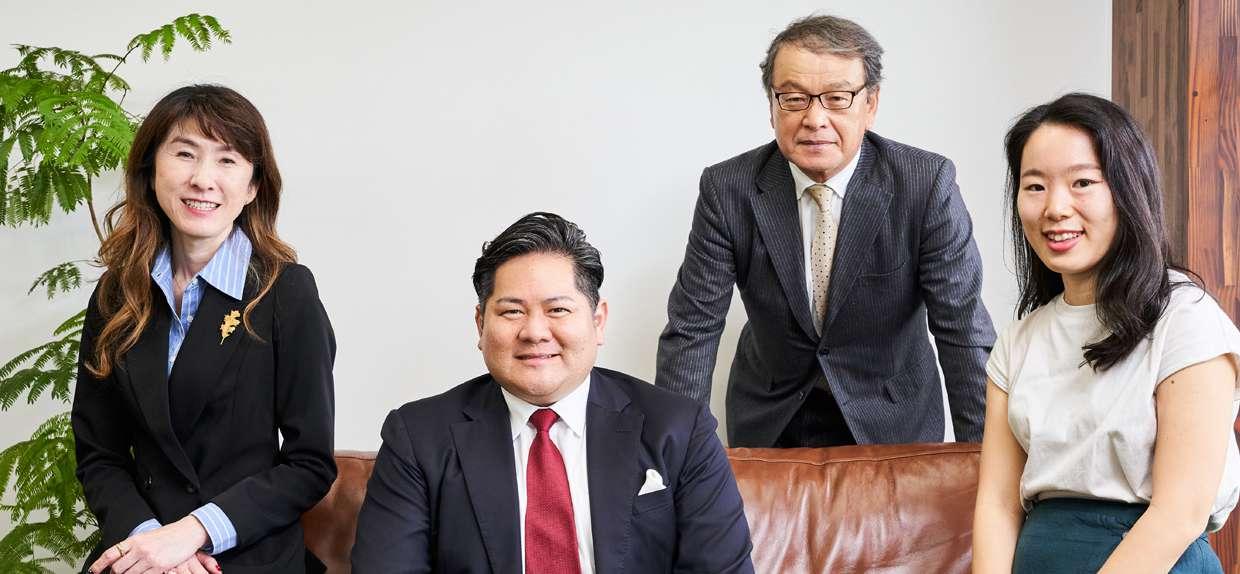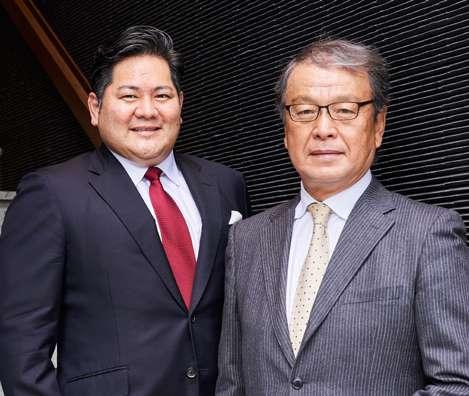
16 minute read
HR
READY TO RECRUIT?
We take the pulse of the bilingual market amid the ongoing pandemic
Advertisement
By Julian Ryall
Japan has always been a challenging market for the total number of permanent positions available from client executive recruitment industry, but the coronavirus companies contracted by less than 10 percent year-on-year. The impact on contract hiring was more significant, however, pandemic has added another level of complexity to down by about 26 percent from the previous year. both sides of the equation: the specialist agencies Yet, by the summer, the market was ticking up again, according to Naylor. that play matchmaker and the companies looking “Since the government lifted the emergency order, the to secure the most capable talent. market has improved step by step,” he said. “We saw, like many of our clients, a significant bounce back in July. agencies, travel industry companies, and retail-oriented busien world Japan, said March turned out to be a “record month” as companies rushed to close critical roles ahead of the hiring freeze that they realized was inevitable.
That freeze, combined with candidates in employment suddenly getting cold feet about a move to a different comsome degree of restrictions on new hires—although the “August and September were a bit slower but have still shown
Recruiters, not surprisingly, saw business drop steeply in a gradual upwards trend in the number of job openings the early months of what, very quickly, devolved into a global available, and in candidates’ willingness to explore career options,” health crisis. But now, they say, companies are adapting their he noted. “The market is still far away from where it was last year, operations to the new normal. This includes hiring accom- but companies are coming to terms with the need to hire people plished staff who will help propel an organization on to bigger to help transform their businesses during this dramatic shift to and better things. some kind of new normal, both internally and out in the market.” CHALLENGES AND RESILIENCE interviewing candidates, said Naylor, which bottomed out in “The immediate impact, during the first few months, came as the summer at 15 percent below 2019’s figures. It has since a bit of surprise to everyone,” admits Eric Cole, president of recovered and is currently just five percent lower compared Cole and Company. “Certain sectors that we cover—advertising with the same period last year. nesses—felt the full force of impact, with radically reduced HEAD WINDS REMAIN budgets, canceled or postponed contracts, and closures of Ryan Yasunari, president and CEO of Envision Co., Ltd., simistores, shops, and other retail outlets.” larly reports a “significant slowdown in the volume of hiring,
But while these companies were facing unprecedented chal- with a large proportion of our clients freezing headcount almost lenges, Cole said he has been very impressed by client companies immediately after the start of the pandemic.” that have shown “a really admirable level of flexibility and And while a gradual recovery is already apparent, Yasunari resilience in dealing with the anticipates that business coronavirus crisis.” Japan “suffers a chronic talent shortage.” will be slow again Not all have struggled. Consumer-oriented sectors, And that can be an opportunity. next year, as the global economy recovers, which such as technology pro- will translate into “jobviders, digital payment, and ad tech, he said, are seeing seekers experiencing difficulty securing new opportunities strong and rapid growth. as competition for a limited number of positions
“Companies that make general, daily-use consumer products, remains intense.” while facing challenges, have a degree of immunity from “However,” he cautioned, “there are significant headwinds Covid-19. People don’t stop brushing their teeth, or replacing in the long term—particularly associated with the increased worn-out shoes, or drinking alcohol because of the crisis. prevalence of recruitment solution services, including recruitCompanies that provide these, and many other, consumables ment process outsourcing and direct sourcing services. still need to develop, manufacture, ship, market, and sell Increased job board participation and the introduction of them—and that requires people with high capability to do artificial intelligence and recruitment technology also threaten their jobs effectively.” the traditional recruitment agency model.” COMEBACK the recruitment sector in Japan, but that it has delayed longerKevin Naylor, vice president of business development at term trends in the global talent market in two ways.
pany—and the new challenges associated with the remote ERIC COLE workplace—began to be felt the following month, he said. President About 40 percent of foreign capital clients introduced Cole and Company One measure of appetite for new hires is clients’ interest in Naylor does not feel the pandemic has fundamentally altered
BUSINESS INDEX | NOVEMBER 2020
Recruitment Business Index—a monthly printed and digital industry company listing— can help you find the best talent, refine your brand, and much more!
journal.accj.or.jp/businessindex
—Ryan Yasunari, president & CEO

—Himanshu Jain, managing director “Our experienced consultants, based in Tokyo and Osaka, execute assignments with a proactive and targeted approach that presents our clients’ businesses and overall objectives effectively to qualified professionals.”

—Struan McKay, representative director/CEO
Envision Co., Ltd. Envision is the preeminent provider of recruitment process outsourcing (RPO) services in Japan. Our integrated approach to hiring enables our clients to reach unsurpassed levels of recruitment success— in both candidate quality and cost-efficiency. ReachExt K.K. We connect professionals with leading companies in Japan and APAC. Headquartered in Tokyo, ReachExt is one of the leading recruitment and executive search companies, offering contingency recruitment services, as well as RPO services, in Japan and Asia–Pacific.
03-3868-2578 info@envision-jpn.com www.envision-jpn.com
03-6453-0361 info@reachext.co.jp www.reachext.co.jp RGF Executive Search RGF Executive Search Japan is a leader in bilingual executive search and recruiting services. Since 1998, we have built an unparalleled track record of sourcing, attracting, and securing the best talent for our clients, from startups to multinational corporations. As part of the Recruit Group, we have been a trusted partner on search assignments for C-Suite and senior to mid-level management roles for over 20 years.
03-4563-1700 struan.mckay@rgf-executive.com www.rgf-executive.jp
KEVIN NAYLOR Vice president of business development en world Japan RYAN YASUNARI President and CEO Envision Co., Ltd.
Hiring Shifts Due to Covid-19
Contract hiring dropped by about 26 percent.
“First, the aging population here in Japan has been shrinking the workforce for a long time already,” he pointed out.
“Second, corporate Japan made a dramatic swing from active global engagement and expansion during the bubble period to a more conservative and internally focused approach in the 20 years that followed. This resulted in fewer Japanese studying and working abroad, sponsored by large Japanese companies, which also gave the appearance of a weakened demand for global skills,” he added. “These two factors combined have resulted in a very small pool of global talent.”
In the past five years, however, an increasing number of Japanese corporates have turned their focus outwards once more, putting extra strain on that small pool of global talent as they go looking for the bilingual and bicultural resources that they have not developed internally.
CHANGING PROCESS There have been other changes, said Yuko Yogo, vice-chair of the American Chamber of Commerce in Japan Human Resource Management Committee.
“Certainly, the pandemic has changed the way we interview people—we’re learning that online interviews are easier to set up, speed up the interview process, and get us the insight we need, although an eventual face-to-face is still desired for a final decision,” she said. “People hired this year are experiencing a different onboarding process than before Covid-19,” she added. “We suspect that those who have joined this year may feel less attachment to their company, as contact with their colleagues, direct reports, and bosses is only through online tools.
“We also notice that people who are concerned about the personal health ramifications of Covid-19 may be thinking more about what is important to them personally, the type of work they want to do, or the type of company they want to work for.”
Jeremy Sampson, managing director of Robert Walters Japan K.K., agrees that companies have been quick to switch to remote interviews and onboarding. A company survey conducted in May revealed that fully 90 percent of companies are carrying out interviews remotely.
He said that there is still demand in certain sectors. “Covid-19 has opened new opportunities for businesses in technology, e-commerce, and healthcare. We have seen an increased demand for services that support remote working environments and online education as a result of rapid adoption of digital tools.
“The digital and technology sectors have always experienced a shortage of highly skilled professionals, and with increased digitalization it is likely that demand will only grow stronger,” he said, adding that the need for bilingual professionals and highly skilled talent across industries “will continue even in the post-Covid-19 era.”





Online interviews have become the norm, and are proving effective.

SUPPLY AND DEMAND The jobs-to-applicants ratio in Japan remains among the highest The bottom line, Sampson said, is that Japan “suffers a chronic in the world, and for roles that require bilingual specialists this talent shortage.” And that can be an opportunity. ratio is even higher, experts point out. And while the pandemic
“Organizations that understand the pandemic is temporary may have affected recruitment trends in the short term, they are shaping their recruitment say, the demand for highly strategies based on their long-term hiring needs,” he While the pandemic may have affected skilled, bilingual professionals remains unchanged. emphasized. “Businesses in recruitment trends in the short term . . . “There are still many industries that are experi- the demand for highly skilled, bilingual companies who are seeking encing particularly acute talent shortages are seizing professionals remains unchanged. to hire talented, effective individuals to manage and the opportunity by actively lead organizations,” said hiring when the competition for talent is not as tight. Cole. “We expect the demand to remain fairly constant. Overall,
“Japan continues to be one of the most challenging markets in I would say that the outlook has gone from a pre-Covid ‘great’ which to secure talent,” he said, pointing to a mismatch between to a mid-Covid ‘good,’ with pockets of great. supply and demand for talent that is further exacerbated by “There may be a slightly more conservative approach to demographic trends—an aging population combined with a the recruitment process, to ensure that the right person is low birthrate that translates into a shrinking workforce. chosen for the role, but the demand is there.” ■
YUKO YOGO Vice-chair, ACCJ Human Resource Management Committee JEREMY SAMPSON Managing director Robert Walters Japan K.K.
Redefining Hiring Success through Disruptive Innovation

By Julian Ryall
The recruitment industry in Japan has largely adhered to the tried-and-trusted approaches that have served permanent placement agencies well for decades. But at a time of massive structural change in the traditional workplace—in Japan and around the world—an alternative model has emerged that works more closely with the employer to ensure that the perfect candidate is identified and, ultimately, hired.
Known as recruitment process outsourcing (RPO), the concept has been applied with great success in North America and Europe for many years, reducing companies’ reliance on traditional recruitment agencies. In Japan, however, RPO has only been practiced for about a decade—and only by a limited number of companies. Adoption is growing, however, as some of the biggest organizations in the world—from multinational banks to major tech players—recognize the value.
Ryan Yasunari, president and chief executive officer of Tokyobased Envision Co., Ltd., believes RPO offers a number of clear advantages to employers looking to land the most capable talent. The ACCJ Journal spoke to him to learn more about the concept.
What is RPO and how does it differ from conventional recruitment methods? RPO is the partial or full outsourcing of a company’s recruitment to a third party to reduce recruitment costs, improve efficiency in the hiring process and the quality of people being hired, and boost scalability. This means that, while traditional recruiters effectively work as a middleman between an employer and a new member of staff—and are typically driven by completing a transaction and moving on to the next candidate—RPO is embedded within a company and works exclusively for them to secure the best people. What are the benefits? If an RPO is fully integrated and aligned with the client company, then it has a far better understanding of the sort of candidates who would work best in that environment, those who are the best “fit.” The RPO is better positioned as a seamless partner to the business and effectively acts as an extension of the internal recruitment function.
Are there different types of RPO? End-to-end RPO covers the entire hiring process—from sourcing through screening, assessing candidates, scheduling interviews, onboarding new talent, monitoring compliance, and carrying out exit interviews. Project or on-demand RPO is designed to manage parts of the hiring process to quickly fill a specific hiring need, often on short notice.
Where is the RPO approach used? It has been around in the United States and Europe for a couple of decades but has really caught on in the past 15 years or so. In fact, a growing majority of companies in the United States have gone nearly 100-percent free of recruitment agency placements altogether. All the big companies have adopted it, from finance to tech to manufacturing, automotive, retail, and all the other sectors with which recruitment agencies traditionally work.
In your experience, do employers like RPO? Definitely. They like the flexibility that it gives them, they like that it is tailored very precisely to their recruitment needs and volume of hiring, and they like that it is highly scalable, which is very important to small and medium-sized enterprises. Companies also do not have to worry about any hiring downtime when their full-time corporate recruiters suddenly decide to leave.
They also like that RPOs can work with them when they need to downsize their teams, such as during a market shift or the pandemic that we are experiencing now. From our perspective, I would like them to think of us as a partner that can help them get through those hard times—although we would clearly be far happier flexing up with them as they grow.
Surely this boutique approach comes at a higher cost? The primary benefit of an RPO is the superior results, in terms of personnel, for the company that is hiring. But, yes, Japan has some of the highest placement fees in the world, with costs generally starting at around 35 percent of annual compensation and rising to 100 percent in some industries. With potential earnings like that, it is no surprise that traditional recruitment agencies are reluctant to introduce an alternative that is less lucrative to them.
An RPO solution is typically management fee-based, meaning that the recruiter is far more interested in delivering the most appropriate candidate than making a quick “sale” that may not be in the best interests of the hiring company. Over the past six years, I estimate that we have saved our clients millions of dollars in placement fees—meaning our service more than pays for itself.
Why has the concept not caught on in Japan previously? That’s a delicate question but, generally, a lot of companies in Japan are still resistant to change. Many are hesitant to drop old and outdated methods of recruitment when they
Ryan Yasunari (left) with Senior Executive Advisor Kazuo Takahashi really would be better served by a different approach, as we have seen in the United States. Also, companies here are typically very reliant on temporary staff rather than hiring people on full-time contracts, because Japanese labor law makes it extremely difficult to let go of employees who are not needed or are underperforming.

Is the coronavirus impacting hiring practices? I believe the pandemic may well serve as the tipping point for RPO. Employers are having to look at new solutions, things they have not tried in the past, to break away from the traditional models. A lot of companies are having to reorganize their talent, some are going to have to rebuild—including some, unfortunately, that must do so essentially from scratch. They have to pause and ask themselves if they really want to go back to the old way of doing things. I really think this is the chance to explore the alternatives.
How can you get the benefits of RPO across to employers? It’s all about communication, and a sense of trust that has to be built up with your partners. We work very closely with senior leadership at our client companies to make sure they understand a recruitment landscape that is constantly changing and evolving, helping them to identify the most appropriate solutions for their situations. Our goal is to make sure that the companies with which we work not only hit but exceed their hiring objectives.
And why is it critical to get the right hires? Japan has always been a candidate-short market, where global clients and, post-Lehman, domestic Japanese companies actively seek bilingual, internationally experienced professionals. As companies continue to grow, the high demands for skilled professionals, combined with the passivity of jobseekers, makes hiring very difficult. And that is truer now than ever. Top-tier talent is the key to making it through this challenging time, and a strong team of high performers has never been more important.
With what sectors does Envision work? We cannot name names, of course, but we have partnered with the largest tech consulting company in the world, European luxury fashion companies that are known around the globe, media and advertising agencies, top-tier European life insurance companies, and others in the retail and automotive sectors. ■
Originally from Honolulu, Hawaii, Ryan Yasunari is a fourth-generation Japanese-American. After relocating to Japan in 1999, he spent nearly 20 years in recruitment, with a background in executive search and corporate HR. Yasunari, aged 46, set up Envision Co., Ltd. in 2014 to meet the “ongoing need for great human resources services and top-tier HR professionals.” Confident in the ability of RPO to deliver results, he is now focused solely on delivering this solution to clients looking for a partner to help increase their hiring performance.
Ready to talk solutions? Contact info@envision-jpn.com or visit: www.envision-jpn.com








